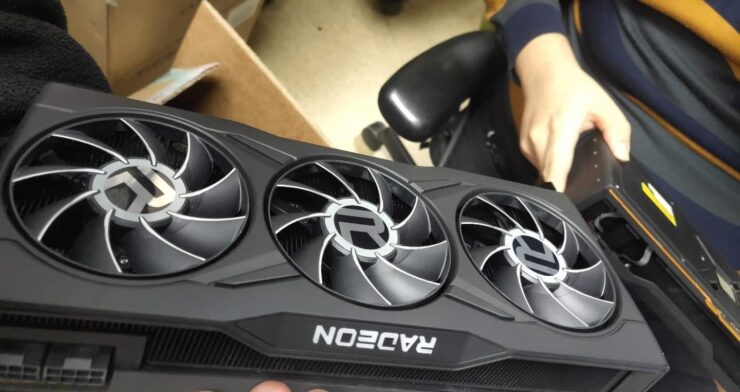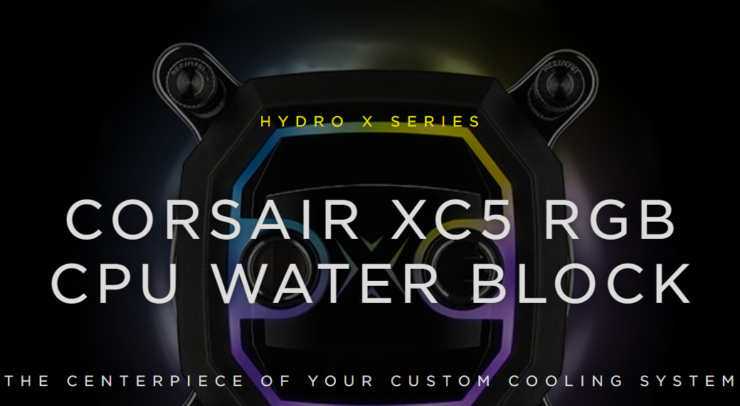Intel Rocket Lake 8 Core & 16 Thread 5.0 GHz CPU Benchmarks Leak Out, On Par With The AMD Ryzen 7 5800X
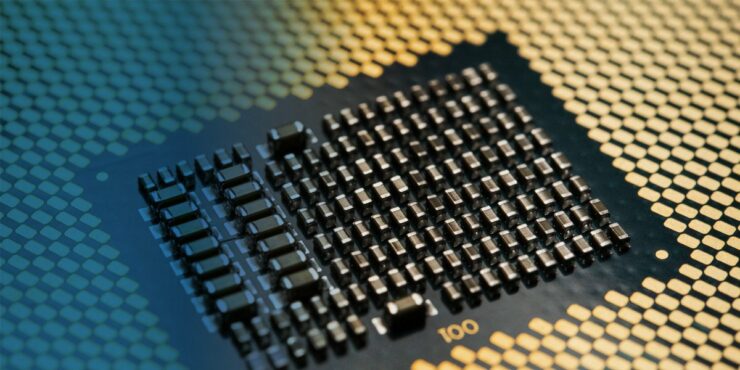
The latest Intel Rocket Lake-S Desktop CPU benchmarks have leaked out too which showcase CPU performance on par with the AMD Ryzen 7 5800X based on the 7nm Zen 3 core architecture. The latest benchmarks were leaked by TUM_APISAK and show the chip running on an HP Omen OEM desktop PC which also suggests that OEMs and partners already have early access to Rocket Lake which launches in early 2021.
Intel Rocket Lake 8 Core & 16 Thread CPU Leaks Out, 5.0 GHz Chip On Par With AMD’s Ryzen 7 5800X
Once again, the platform the Intel Rocket Lake CPU was tested on is an HP OMEN 30L Desktop GT13-0xxx which features the HP 886C motherboard. This is an HP exclusive motherboard and runs the LGA 1200 socket which will support Intel’s upcoming 11th Generation Core processors.
As for the chip itself, the Intel Rocket Lake CPU, presumably the Core i9-11900K, features 8 cores and 16 threads. This should be the top SKU since Rocket Lake maxes out at 8 cores. The chip has 16.0 MB of L3 cache, 4 MB of L2 cache, and clock speeds are reported at 3.40 GHz base and 5.00 GHz boost. Within the Geekbench 5 data, it is reported that the boost clock was functioning fully normal as all cores were running at around 5.0 GHz clocks.
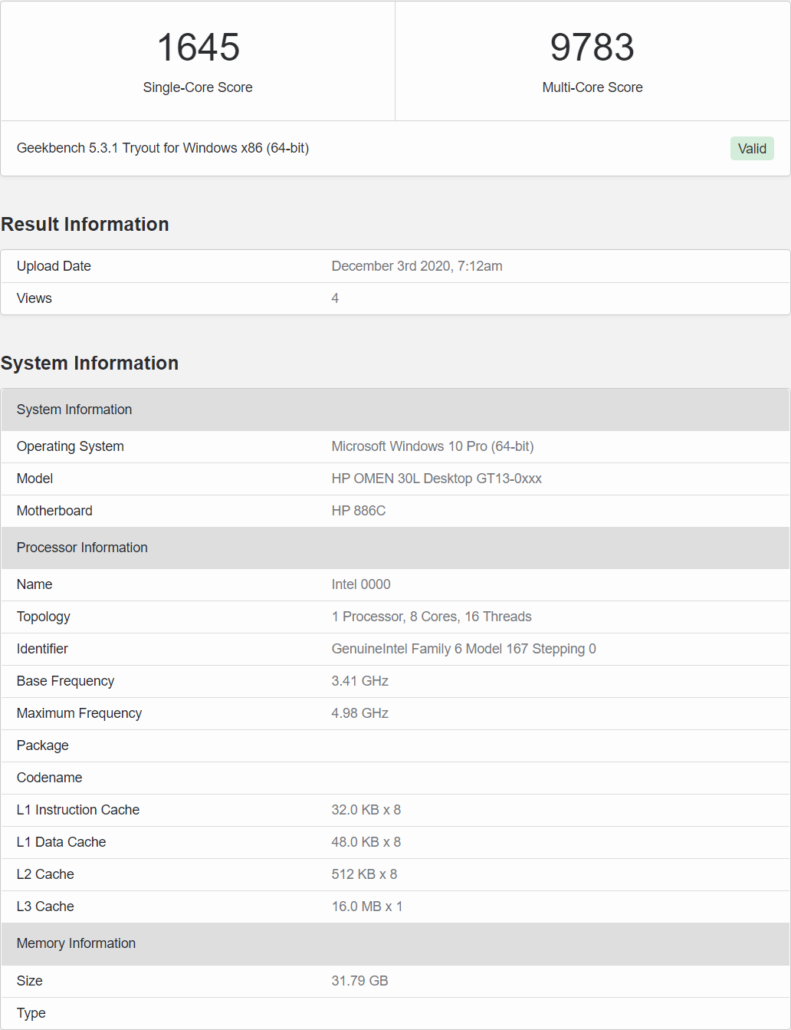
Coming to the performance, the Intel Rocket Lake CPU score 1645 points in the single-core and 9783 points in the multi-core tests. If we were to compare these results with AMD’s fastest 8 core and 16 thread Zen 3 offering, the Ryzen 7 5800X, we will find that the score is about on par with the competition. The Ryzen 7 5800X scores 1661 in single-core and 10367 in multi-core on average. Since these aren’t the final clock speeds for the Rocket Lake CPU yet, we can expect the 11th Gen family to be just slightly faster than the Zen 3 based Vermeer family.
Intel Rocket Lake 8 Core CPU Geekbench 5 Benchmark Comparison:
| CPU Name | Single-Core Performance | Multi-Core Performance | Single Core Perf vs Rocket Lake | Multi Core Perf vs Rocket Lake |
|---|---|---|---|---|
| Intel Core i9-10900K | 1407 | 11014 | 17% Slower | 12% Faster |
| AMD Ryzen 7 5800X | 1661 | 10367 | 1% Faster | 6% Faster |
| Intel Rocket Lake Core i9-11900K? (8 Core / 16 Thread) | 1645 | 9783 | N/A | N/A |
| Intel Core i7-10700K | 1351 | 8991 | 22% Slower | 9% Slower |
| AMD Ryzen 7 3800X | 1292 | 8979 | 27% Slower | 9% Slower |
Compared to its predecessor, the Core i7-10700K, the Rocket Lake CPU is 21% faster in single-core and 9% faster in multi-threaded tests. The Core i9-10900K is 17% slower in single-core but slightly faster at around 12% than the Rocket Lake CPU due to its higher number of cores and threads. It looks like 14nm will result in a higher power draw and higher temperatures than the competition so while Intel may have a slight price advantage, they will lose big on the efficiency numbers as has been the case against Ryzen for several generations starting Coffee Lake.
Here’s Everything We Know About The 11th Generation Desktop CPUs
Intel’s Rocket Lake-S desktop CPU platform is expected to feature support on LGA 1200 socket which will make its debut with Comet Lake-S CPUs although on 400-series motherboards. The Intel Rocket Lake-S processors will be launching alongside the 500-series motherboards but it has since been confirmed that LGA 1200 motherboards will offer support for Rocket Lake-S CPUs, especially given the fact that PCIe Gen 4.0 is a prominent feature of Z490 motherboards which would only be enabled with the use of Rocket Lake-S desktop CPUs.
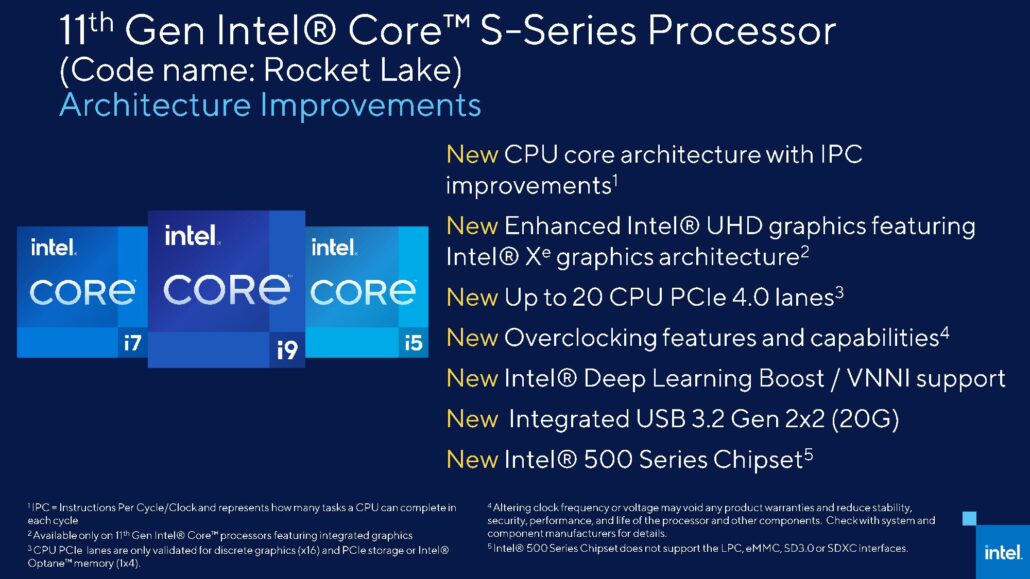
Main features of Intel’s Rocket Lake Desktop CPUs include:
- Increased Performance with new Cypress Cove core architecture
- Up to 8 cores and 16 threads (Double Digit IPC Gains Over Skylake)
- New Xe graphics architecture (Up To 50% higher Performance Than Gen9)
- Increased DDR4 3200 MHz Memory Support
- CPU PCIe 4.0 Lanes (Available on Z490 & Z590 Motherboards)
- Enhanced Display (Integrated HDMI 2.0b, DP1.4a, HBR3)
- Added x4 CPU PCIe Lanes = 20 Total CPU PCIe 4.0 Lanes
- Enhanced Media (12 bit AV1/HVEC, E2E compression)
- CPU Attached Storage or Intel Optane Memory
- New Overclocking Features and Capabilities
- USB Audio offload
- Integrated CNVi & Wireless-AX
- Integrated USB 3.2 Gen 2×2 (20G)
- 2.5Gb Ethernet Discrete LAN
- Discrete Intel Thunderbolt 4 (USB4 Compliant)

The architecture for Rocket Lake CPUs is said to be Cypress Cove which is reportedly a hybrid between the Sunny Cove and Willow Cove design but will feature Xe Gen 12 GPU architecture. We have also been told that the Z590 motherboard series with Thunderbolt 4.0 support will be announced later this year so expect more information on Rocket Lake CPUs in the coming months.
Intel Desktop CPU Generations Comparison:
| Intel CPU Family | Processor Process | Processors Cores (Max) | TDPs | Platform Chipset | Platform | Memory Support | PCIe Support | Launch |
|---|---|---|---|---|---|---|---|---|
| Sandy Bridge (2nd Gen) | 32nm | 4/8 | 35-95W | 6-Series | LGA 1155 | DDR3 | PCIe Gen 2.0 | 2011 |
| Ivy Bridge (3rd Gen) | 22nm | 4/8 | 35-77W | 7-Series | LGA 1155 | DDR3 | PCIe Gen 3.0 | 2012 |
| Haswell (4th Gen) | 22nm | 4/8 | 35-84W | 8-Series | LGA 1150 | DDR3 | PCIe Gen 3.0 | 2013-2014 |
| Broadwell (5th Gen) | 14nm | 4/8 | 65-65W | 9-Series | LGA 1150 | DDR3 | PCIe Gen 3.0 | 2015 |
| Skylake (6th Gen) | 14nm | 4/8 | 35-91W | 100-Series | LGA 1151 | DDR4 | PCIe Gen 3.0 | 2015 |
| Kaby Lake (7th Gen) | 14nm | 4/8 | 35-91W | 200-Series | LGA 1151 | DDR4 | PCIe Gen 3.0 | 2017 |
| Coffee Lake (8th Gen) | 14nm | 6/12 | 35-95W | 300-Series | LGA 1151 | DDR4 | PCIe Gen 3.0 | 2017 |
| Coffee Lake (9th Gen) | 14nm | 8/16 | 35-95W | 300-Series | LGA 1151 | DDR4 | PCIe Gen 3.0 | 2018 |
| Comet Lake (10th Gen) | 14nm | 10/20 | 35-125W | 400-Series | LGA 1200 | DDR4 | PCIe Gen 3.0 | 2020 |
| Rocket Lake (11th Gen) | 14nm | 8/16 | TBA | 500-Series | LGA 1200 | DDR4 | PCIe Gen 4.0 | 2021 |
| Alder Lake (12th Gen) | 10nm? | 16/24? | TBA | 600 Series? | LGA 1700 | DDR5 | PCIe Gen 5.0? | 2021 |
| Meteor Lake (13th Gen) | 7nm? | TBA | TBA | 700 Series? | LGA 1700 | DDR5 | PCIe Gen 5.0? | 2022? |
| Lunar Lake (14th Gen) | TBA | TBA | TBA | 800 Series? | TBA | DDR5 | PCIe Gen 5.0? | 2023? |

